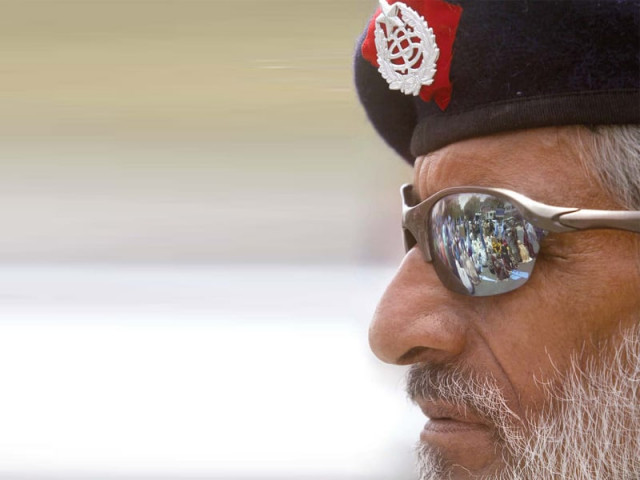To protect and [under]serve: Karachi has 1 policeman to protect every 2,000 people
VIP security putting a squeeze on police strength, budget.

An estimated 20 million people live in Karachi and there are only 10,000 police officers to protect them. That means there is one policeman to protect around 2,000 people.
The strength of the police force in the city is around 30,000 and they work in two shifts. Out of the total figure, at least 5,000 police personnel — excluding the paramilitary forces that contribute an additional manpower of 2,000 — are deployed solely for VIP security. These Very Important People include MNAs, MPAs political and religious leaders, bureaucrats, police high-ups, members of the judiciary, businessmen, consulates and other diplomats.
The 25,000 police left are divided into two categories: operational and investigation divisions. Nearly 18,000 policemen make up the operational wing, which is mainly there to serve the people. These men are on the ground, responsible for snap-checking and patrolling, and at police stations across the city. But they work in two shifts of day and night, which shrinks the force to around 10,000 in the day and 8,000 in the night. Policemen are often on leave as well.
That leaves roughly 7,000 men who make up the special and investigation branches, who do not handle daily crime. So in a particular day, the people have just 10,000 policemen to protect them.
According to experts, a minimum of 20,000 policemen are needed on the ground. But Sharfuddin Memon, who is a planning, police and public relations consultant for the home ministry and is a former chief of the Citizens-Police Liaison Committee, thinks 50,000 personnel are required.
Problems
VIP security puts a squeeze on the police budget. More than Rs117 million is spent every month on the security of senior officials, legislators and other “important people” from the regular budget of the Sindh police, said a senior police officer requesting anonymity. On an average, the department spends Rs26,000 on the salary of each policeman every month. At least 200 vehicles are completely occupied for VIP security and the maintenance of these vehicles is an added burden on the budget.
Another senior officer said that most policemen are either deployed as security guards or are performing duties which do not help with operational policing. “The level of threat to important personalities is higher than ever before which is why one cannot compromise on their security. But we need to deal with these new challenges and look for new ways and better policies,” he said.
Apart from money matters, the 30,000 police force is not enough. “At least four policemen deal with one suspect during snap-checking or patrolling and they take half an hour to an hour to settle the matter - mostly over money,” said one SSP. “Criminals, of course, take advantage of this.”
‘Anyone can get VIP security’
Memon said there are no set criteria of how and whom to provide security. “VIPs, banks, petrol pumps, commercial areas, anyone is provided security if they are seriously threatened,” he said. “But we need to have a set procedure and system in place.”
Ideally, the person asking for security should have to write an application to the police authorities, informing them of the threats. Then the police department would forward the application to the home department for approval, he explained. “Also, if the department provides security then that person must contribute to the salary and other allowances of the policemen.” But in a country where no one is ready to pay taxes, hoping this, is nearly impossible, he added.
VIP (and relatives’) security
“The police are not only deployed for the security of individuals like MPAs, MNAs, political and religious leaders, bureaucrats, the judiciary and businessmen, but they are also guarding their houses, offices and even their children,” said retired DIG Alauddin Abbasi. The relatives of these people milk the situation. “They are getting policemen for their security without any legal basis.”
Retired and suspended policemen also get VIP protocol - for life, it seems. “People should get security only for a certain time period and they should be able to renew the security if and when needed. But this does not happen,” explained Abbasi.
Solutions
The authorities need to increase funding and the police strength, the SSP suggested. “The biggest challenge is recruiting more people.”
“The operational and investigation wings should be merged as they were before and with this, we would have some good strength,” said another officer. “It is all a matter of priority. Otherwise the security of the people will be constantly compromised because of a few others.”
Published in The Express Tribune, May 23rd, 2011.



















COMMENTS
Comments are moderated and generally will be posted if they are on-topic and not abusive.
For more information, please see our Comments FAQ